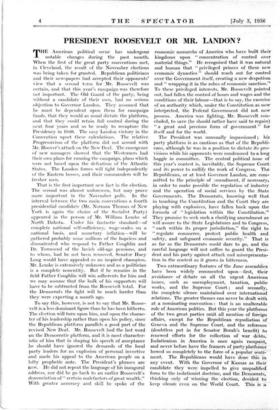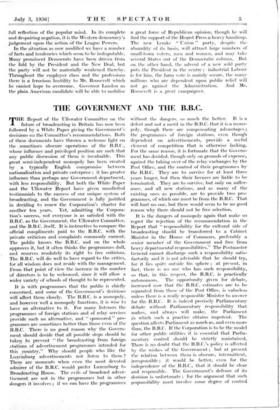PRESIDENT ROOSEVELT OR MR. LANDON ?
THE American political scene has undergone notable changes during the past month. When the first of the great party conventions met, in Cleveland, the result of the November elections was being taken for granted. Republican politicians and their newspapers had accepted their opponents' view that a second term for Mr. Roosevelt was certain, and that this year's campaign was therefore not important. The Old Guard of the party, being without a candidate of their own, had no serious objection to Governor Landon. They assumed that he must be dependent upon them for campaign funds, that they would as usual dictate the platform, and that they could retain full control during the next four years and so be ready to recapture the Presidency in 1940. The easy Landon victory in the Convention upset these calculations. The relative Progressivism of the platform did not accord with Mr. Hoover's attack on the New Deal. The emergence of new managers showed that the Westerners had their own plans for running the campaign, plans which were not based upon the defeatism of the Atlantic States. The Landon forces will fight independently of the Eastern bosses, and their commanders will be fresher men.
That is the first important new fact in the election. The second was almost unforeseen, but may prove more important in the November polls. In the interval between the two main conventions a fourth presidential candidate (Mr. Norman Thomas of New York is again the choice of the Socialist Party) appeared in the person of Mr. William Lemke of North Dakota. Under his fantastic standardof complete national self-sufficiency, wage-scales on a national basis, and monetary inflation—will be gathered probably some millions of the hopeless and discontented who respond to Father Coughlin and Dr. Townsend of the lavish old-age pensions, and to whom, had he not been removed, Senator Huey Long would have appealed as an inspired champion. Mr. Lemke is extensively unknown and as a politician is a complete nonentity. But if he remains in the field Father Coughlin will win adherents for him and we may assume that the bulk of his supporters will have to be subtracted from the Roosevelt total. For the Democrats the fight will be much harder than they were expecting a month ago.
To say this, however, is not to say that Mr. Roose- velt is a less dominant figure than he has been hitherto. The election will turn upon him, and upon the charac- ter of his leadership rather than upon his policy, since the Republican platform parallels a good part of the revised New Deal. Mr. Rocisevelt had the last word on the Democratic platform, and it is most character- istic of him that in shaping his speech of acceptance he should have ignored the demands of the local party leaders for an explosion of personal invective and made his appeal to the American people on a lofty prophetic note. The President's phrases are' new. He did not repeat the language of his inaugural address, nor did he go back to an earlier Roosevelt's denunciation of " certain malefactors of great wealth."' With greater accuracy and skill he spoke of the economic monarchs of America who have built their kingdoms upon " concentration of control over material things." He recognised that it was natural and human that " privileged princes of these new economic dynasties " should reach out for control over the Government itself, creating a new despotism and " wrapping it in the robes of economic sanction." To these privileged interests, Mr. Roosevelt pointed out, had fallen the control of hours and wages and the conditions of their labour—that is to say, the exercise of an authority which, under the Constitution as now interpreted, the Federal Government did not now possess. America was fighting, Mr. Roosevelt con- cluded, to save (he should rather have said to regain) " a great and precious form of government " for itself and for the world.
The President was unusually impassioned ; his party platform is as cautious as that of the Republi- cans, although he was in a position to dictate its pro- visions while his opponents were condemned to a long haggle in committee. The central political issue of this year's contest is, inevitably, the Supreme CoUrt" and its power to nullify the work of Congress. The Republicans, or at least Governor Landon, are com- mitted to the principle of amendment, if necessary, in order to make possible the regulation of industry and the operation of social services by the State Governments. The Democrats, knowing well that in touching the Constitution and the Court they are playing with exploSives, have fallen back upon the formula of " legislation within the Constitution." They promise to seek such a clarifying amendment as will assure to the State Legislatures and to Congress, " each within its proper jurisdiction," the right to " regulate commerce, protect public health and safety, and safeguard economic security." That is as far as the Democrats could dare to go, and the careful language will not suffice to guard the Presi- dent and his party against attack and misrepresenta- tion in the contest as it grows in bitterness.
Two extraordinary features of the June assemblies have been widely commented upon—first, their avoidance of debate on all the urgent American issues, such as unemployment, taxation, public works, and the Supreme Court ; and secondly, the complete silence maintained over international relations. The greater themes can never be dealt with at a nominating convention : that is an unalterable rule of American politics. But this year the platfOrnA of the two great parties omit all mention of foreign affairs, except for the Republican - repudiation of Geneva and the Supreme' COurt, and the reference (doubtless put in for Senator Borah's benefit) to renewed efforts for the collection of war debts, Isolationism in America is once again rampant, and never before have the framers of party platforms bowed so completely to the force of a popular senti: ment. The Republicans would haVe done thiS in any .eveht. With the GovernOr of Kansas as their candidate they were impelled to give unqualified form to the isolationist doctrine, and the Democrats,' thinking Only of -Winning the election, decided 'to keep silen& even' On. the World Court. This is -a"- full reflection of the popular mind. In its complete and despairing negation, it is the Western democracy's judgement upon the action of the League Powers.
In the situation as now modified we have a number of facts and tendencieswhich seem to be indisputable. Many prominent Democrats have been driven from the fold by the President and the New Deal, brit the 'party will not. be materially weakened thereby. Thionghout the employer' class and the professions there is a ferocious-hostility to Mr. Roosevelt which he cannot hope to overcome. Governor Landon as the plain American candidate will be able to mobilise a great force of Republican opinion, though he will find the support-of the Hearst Press n-heavy handicap. The new Lemke " Union " party, despite the absurdity of its basis, will attract large numbers of small-town voters, men and women, and may take several States out of the Democratic column. But on the other hand, the advent of a new wild party puts the President in the centre ; industrial Labour is for hiM, the farm vote is mainly secure, the many millions who are dependent upon public relief will not go against the Administration. And Mr. Roosevelt is a great campaigner.















































 Previous page
Previous page